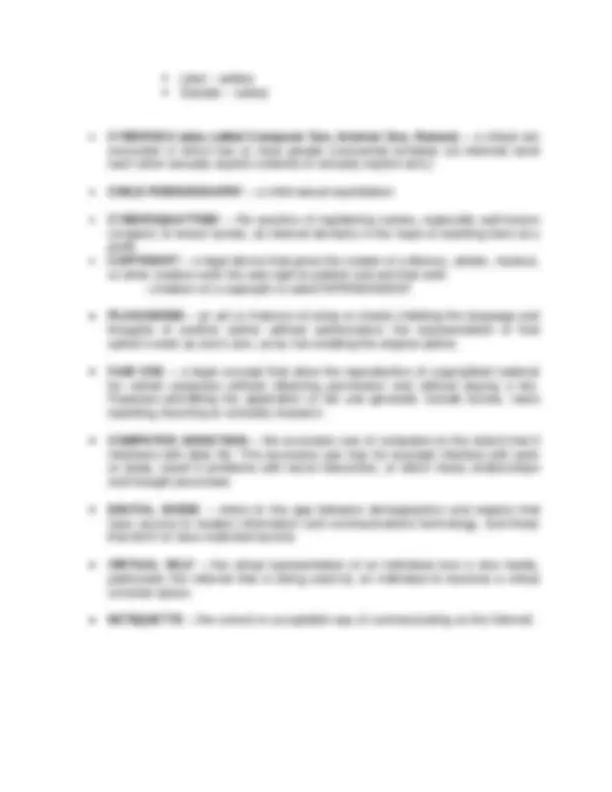



Study with the several resources on Docsity

Earn points by helping other students or get them with a premium plan


Prepare for your exams
Study with the several resources on Docsity

Earn points to download
Earn points by helping other students or get them with a premium plan
Community
Ask the community for help and clear up your study doubts
Discover the best universities in your country according to Docsity users
Free resources
Download our free guides on studying techniques, anxiety management strategies, and thesis advice from Docsity tutors
This document presents the different issues in Media and information Literacy and their meanings.
Typology: Lecture notes
1 / 2

This page cannot be seen from the preview
Don't miss anything!


LEGAL, ETHICAL and SOCIETAL ISSUES in Media and Information Literacy Republic Act 10175 or the Cybercrime Law of 2012
Libel – written Slander – verbal CYBERSEX (also called Computer Sex, Internet Sex, Netsex) – a virtual sex encounter in which two or more people (connected remotely via internet) send each other sexually explicit contents or sexually explicit acts.) CHILD PORNOGRAPHY – a child sexual exploitation CYBERSQUATTING – the practice of registering names, especially well-known company or brand names, as internet domains in the hope of reselling them at a profit. COPYRIGHT – a legal device that gives the creator of a literacy, artistic, musical, or other creative work the sole right to publish and sell that work.
- violation of a copyright is called INFRINGEMENT. PLAGIARISM – an act or instance of using or closely imitating the language and thoughts of another author without authorization; the representation of that author’s work as one’s own, as by not crediting the original author. FAIR USE – a legal concept that allow the reproduction of copyrighted material for certain purposes without obtaining permission and without paying a fee. Purposes permitting the application of fair use generally include review, news reporting, teaching or scholarly research. COMPUTER ADDICTION – the excessive use of computers to the extent that it interferes with daily life. This excessive use may for example interfere with work or sleep, result in problems with social interaction, or affect mood, relationships and thought processes. DIGITAL DIVIDE – refers to the gap between demographics and regions that have access to modern information and communications technology, and those that don’t or have restricted access. VIRTUAL SELF – the virtual representation of an individual over a new media, particularly the internet that is being used by an individual to traverse a virtual common space. NETIQUETTE – the correct or acceptable way of communicating on the Internet.